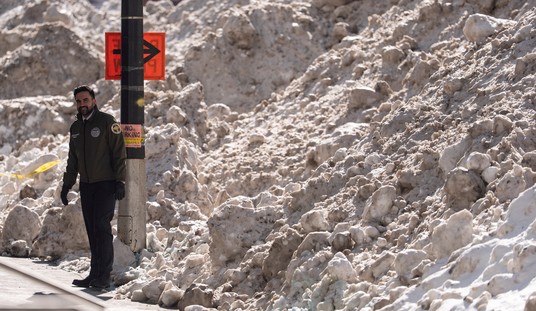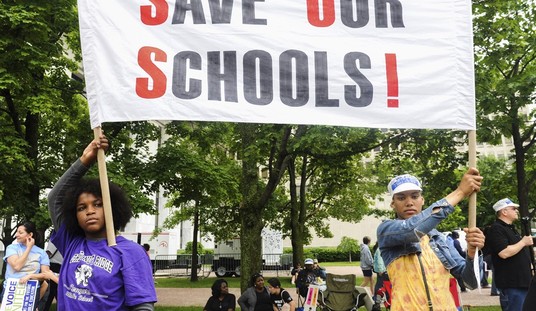As we previously reported, not only is Canada’s state-funded public radio/TV station CBC disgustingly sifting through information illegally obtained by hackers into the GiveSendGo database about Freedom Convoy donors, but they’re also using the info to harass the donors by calling and/or emailing them to find out out “why” they support the movement.
Not surprisingly, the donor information that was posted online by the self-confessed hacker is also being pored over by U.S. media outlets like the Washington Post who are hungry to find supposed “evidence” that supporters of the trucker convoy are dangerous, “white supremacist” insurrection-y types who nobody but the federal authorities should pay attention to.
But on Wednesday, those who donated to the convoy were on the receiving end of a surprising defense by Rep. Ilhan Omar (D-Minn.), who slammed media outlets who were exploiting the hacked information and in the process likely putting private citizens in further danger:
I fail to see why any journalist felt the need to report on a shop owner making such a insignificant donation rather than to get them harassed. It’s unconscionable and journalists need to do better. https://t.co/oF7WIoS1jp
— Ilhan Omar (@IlhanMN) February 16, 2022
The tweet Omar shared was from Alison Mah, who is the editor of the Ottawa Citizen/Sun. It’s not visible now because Mah locked down her Twitter account after she received backlash from Omar and others for promoting a story her news outlet wrote about the owner of an Ottawa cafe who donated a small amount to the Freedom Convoy but who now supposedly regrets it. The information the Ottawa Citizen used to contact the donor came from the hacked database.
In response to Omar taking the right stance on an important issue for a change, so-called “journalists” and other media figures pounced and seized, proclaiming that Omar got it all wrong and that it was vital that reporters be able to use all tools at their disposal including illegally obtained information about private citizens in the name of the “public interest” or something.
One that stood out to me was self-described “CBS Sports alum” and digital media expert Jason Kint who, ironically, was very fauxfended not over the fact that the cafe owner was on the receiving end of harassment as a result of media exploitation, but that Omar may have brought harassment on … the journalist.
“[N]ot helpful, Rep Omar. You’ve now caused *more* harassment,” he tweeted. “This journalist was doing her job; and now she’s being harassed. If you read the report she shared, you’ll see it covered how the shop owner was already being harassed as her name was in the leaked database.”
Note how there was no concern from Kint expressed whatsoever about the fact that the Ottawa Citizen likely brought on “*more* harassment” against the citizen.
In another instance, Wall Street Journal reporter Byron Tau inquired to critics of the Washington Post report on the donors why it was so wrong for them to latch onto the information.
“Am confused how this is in any way objectionable,” Tau wrote. “What else is a reporter supposed to do — not look at it? Not try to confirm that it’s authentic? Not try to call people to understand their views and what motivated them to donate?”
A couple of minutes later, he kinda sorta appeared to have a revelation but still suggested that it was legitimate journalism to call people who wished to remain anonymous if a reporter wanted to.
“I agree that publishing people’s names, especially small donors with no public profile, who wished to remain anonymous raises a thorny set of questions,” Tau opined. “But calling them to talk and see if they want to speak to you… is journalism?”
Other critics of Omar pointed to Fox News’ reporting on the cafe owner, which referenced the Ottawa Citizen piece, as supposed “proof” that the doxing/hacking into the information of private citizens should be considered okay, but such arguments completely miss the point.
Every single person alive today including journalists and private citizens alike has inherent responsibilities that are just understood. Among them is to weigh the benefits versus the risks of sharing certain information publicly, whether it’s already available for public consumption or not.
When it comes to anything related to government officials, pretty much everything is on the table for sharing outside of private information about young family members. But when it comes to Average Joes and Janes, there are a different set of rules.
For instance, there are stories my neighbors share with me that I’m not going to put on full blast on Nextdoor because that would be wrong to do. Journalists have the same and perhaps an even greater responsibility in this regard due to how far and wide their reports can spread. The donors to the Freedom Convoy are not public officials (with rare exceptions) and donated with the reasonable expectation that their information would be kept secure. Except it wasn’t. The information was hacked and uploaded for all the world to see.
Do journalists technically have the right to glean illegally obtained information made public by a hacker and use that info to contact people to get their stories? Yes. But should they do so? Outside of a rare instance where they may have info from a credible source that the person they’re contacting means to harm someone, my view is no, they shouldn’t.
The old saying about “with freedom comes responsibility” comes to mind here. Just because one has the right to do something doesn’t necessarily make it right to do, and that goes doubly so for media outlets. The interests of the public must factor into a proposed story – in other words, what benefit does it serve the public to put out private information about a rank and file citizen whose apparent “crime” was to make a donation to a non-violent cause they support?
In other words, in this particular scenario, why should anyone give a royal rip as to who donated to the convoy?
That said, these hit pieces always bring to mind how incurious the media often is when it comes to donations to radical groups like Black Lives Matter. Case in point:
Hi @byaaroncdavis, when the WaPo gets done doxxing the Freedom Convoy, could they look into the people behind these donations, too, please? Thanks. https://t.co/K1r1EFkwTY
— Sister Toldjah 😁 (@sistertoldjah) February 16, 2022
Let’s not hold our breath on that one, though, because narratives and stuff.















Join the conversation as a VIP Member